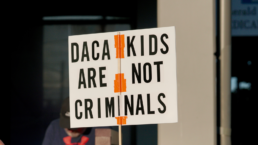By Sara Herschander, Waging Nonviolence
Over 100 undocumented immigrants and their supporters descended on a federal appeals court in New Orleans Wednesday, as oral arguments began on a case that will determine the future of DACA, or Deferred Action for Childhood Arrivals — the program protecting hundreds of thousands from deportation.

José Coronado Flores, 25, a DACA recipient and organizer for the immigration advocacy group CASA, traveled from Maryland to the courtroom at the 5th U.S. Circuit Court of Appeals, as attorneys debated the legality of the program in the case of Texas v. United States. Since its inception over a decade ago, DACA has provided temporary work status and protection from deportation to people brought into the U.S. as children.
“For a lot of people, DACA is just a word or a political talking point,” Coronado Flores said. “But, for all of the people who have DACA, it’s the difference between keeping their scholarship and their job — between being able to live your own life, pay for your own food, have an apartment, and support your parents.”
Even as DACA’s future is debated — and that of its over 600,000 recipients — activists like Coronado Flores described an atmosphere of solidarity rather than despair. In particular, they feel energized by each other’s commitment to continue fighting for DACA’s preservation, and for more permanent immigration relief.
“It was my first time ever being around so many people with DACA, which was mind-blowing and super motivating,” said Coronado Flores, who also marched through New Orleans’ French Quarter alongside dozens of other DACA recipients, often called “Dreamers.”
“We’re trying to build that grassroots power, but we’re also creating these spaces for each other to talk about what we want to talk about, what we’re scared to talk about, and what we want to change,” he said.
Last year, U.S. District Court Judge Andrew Hanen ruled against the legality of DACA after Texas and other states sued to block the program nearly 10 years after its creation under the Obama administration. Since then, the Department of Homeland Security has not approved new applicants to the program, though renewals have been allowed to continue.
The Biden administration, several states and individual DACA recipients are currently leading the appeal of that decision to a panel of federal judges at the 5th U.S. Circuit Court. Regardless of the panel’s ruling, the losing side is likely to seek further review by the full bench of the 5th Circuit and ultimately the Supreme Court.
Jung Woo Kim, 38, co-director of NAKASEK, is one of 22 Dreamers acting as defendant-intervenors in Texas v. United States, and he has played a leading role in organizing several of the actions surrounding the hearings on Wednesday.
“This struggle is way bigger than DACA. It’s bigger than just the immigrant community,” Kim said, emphasizing how the case connects to other issues of justice being arbitrated by the court system and Congress. “This is a time to really do solidarity with folks in climate justice, racial justice and gender justice.”
During a ‘Vigil For Our Future’ held outside of the courthouse, Kim and other activists took to the streets, banging drums, folding origami butterflies and chanting “immigrant power” to demand that DACA remain in place, and that Congress pass a pathway to citizenship for all 11 million undocumented immigrants in the United States.
“What gives me hope is that we don’t give up — we fall down and we get up again,” said José Patiño, a 33-year-old DACA recipient and organizer. “It’s something we get from our parents or loved ones who brought us here.”
According to Patiño, who is vice president of education and external affairs at Aliento, activists and organizers are “preparing for the worst, but hoping for the best” on the 5th Circuit’s ruling. For Aliento, that has meant supporting young people and their families through mental health programming and events, in addition to education and advocacy, as they cope with DACA’s uncertain future.
“When the ruling comes out, one thing that won’t change is that we’re here to stay,” said Kim, who organizes with NAKASEK. “It’s just a piece of paper, but the lives that we have and our families and friends and community mean that we’ll keep moving forward.”
Sara Herschander is a freelance journalist and audio producer based in New York City. Her work has appeared in The American Prospect, Documented NY, and Univision, among other publications.
Recent Posts
U.S. Media Keen on Iranian Unrest—Less So on U.S. and Israel’s Role in It
January 30, 2026
Take Action Now Democrats have a rare moment of leverage to pass legislation ending qualified immunity for Immigration and Customs Enforcement…
The Senate Must Not Fund ICE, A Zero Hour Conversation With Sonali Kolhatkar
January 30, 2026
Take Action Now “We’ve seen a really sharp change in how the public views immigration enforcement, particularly ice, to the point where…
How Democrats Can End Qualified Immunity for ICE Agents
January 28, 2026
Take Action Now Democrats have a rare moment of leverage to pass legislation ending qualified immunity for Immigration and Customs Enforcement…
Save New START- Nuclear Arms Treaties Must Not Expire
January 27, 2026
Take Action Now Letting New START expire would end more than a treaty — it would end the last remaining restraint on nuclear escalation.By Leah…




